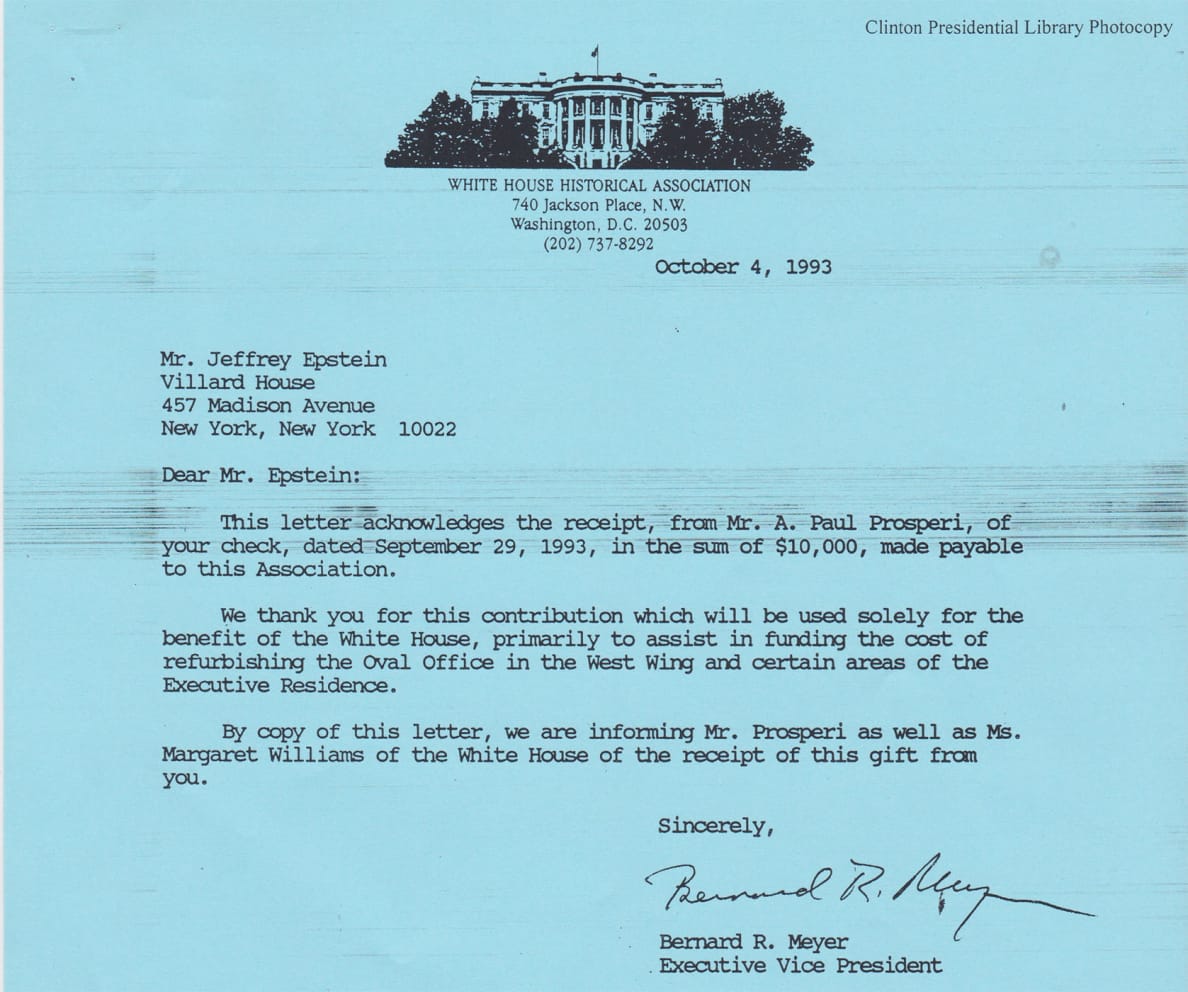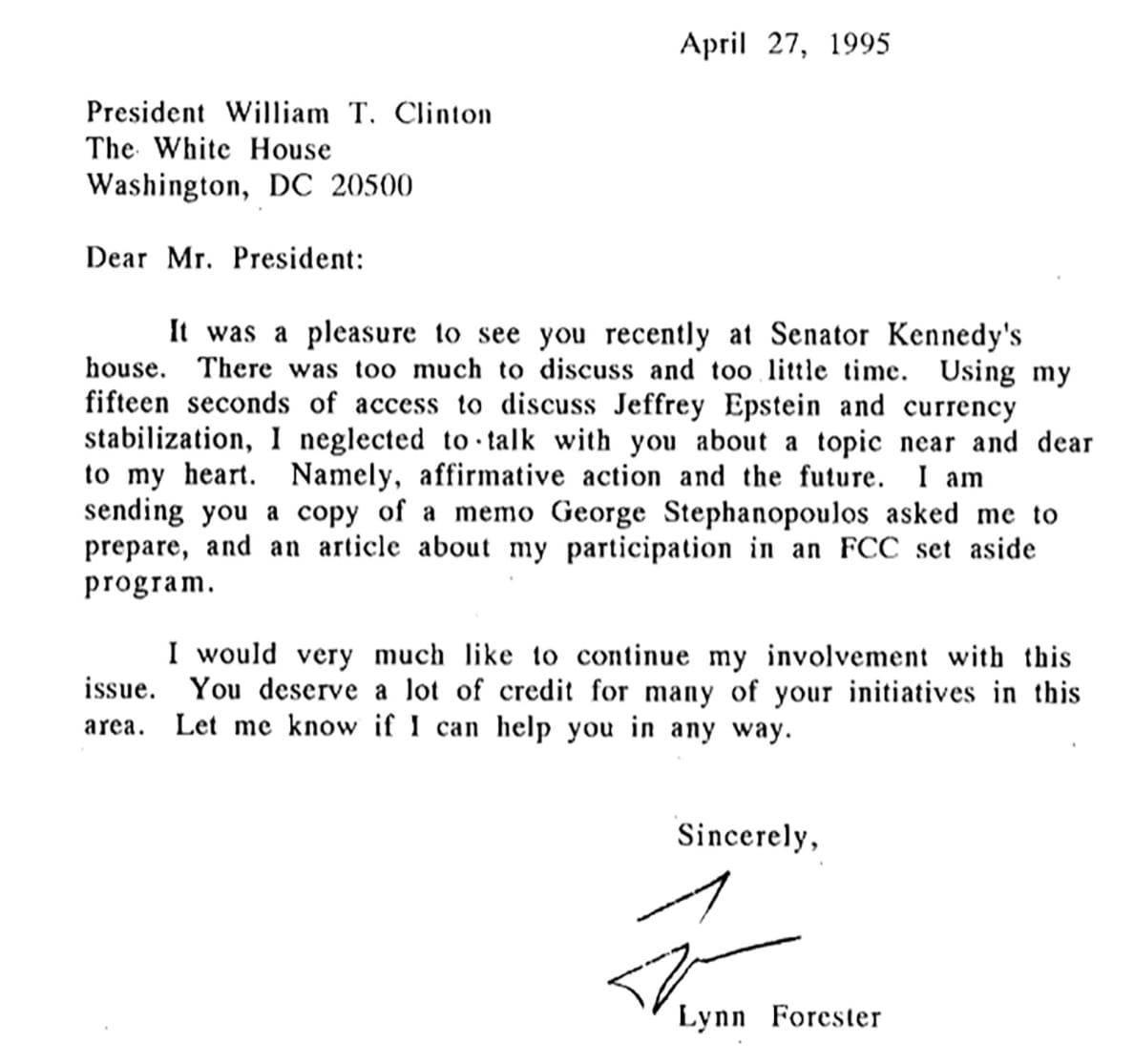EXCLUSIVE: Jeffrey Epstein Visited Clinton White House Multiple Times in Early ’90s
Jeffrey Epstein Visited Clinton White House Multiple Times in Early ’90s
E
ditor's note: On August 10, 2019, Jeffrey Epstein died in an apparent jailhouse suicide. For more information, see The Daily Beast's reporting here.
Days after
Jeffrey Epstein’s arrest on
sex-trafficking charges in New York, Bill Clinton distanced himself from the high-flying financier and convicted sex offender. The former president owned up to just six encounters with Epstein, starting in 2002: four flights on the billionaire’s private jet, a single trip to his Harlem office, and one “brief visit” to his New York apartment, all with staff and security detail in tow.
Now, a Daily Beast investigation has uncovered ties between Epstein and the Clinton administration that date back to the president’s earliest days in the White House, casting doubt on the oft-circulated narrative that the two only began associating after Clinton left office.
As early as 1993, records show, Epstein donated $10,000 to the White House Historical Association and attended a donors’ reception hosted by Bill and Hillary Clinton. Around the same time, according to a source familiar with the connection, Epstein visited presidential aide Mark Middleton several times at the White House. Two years later, businesswoman Lynn Forester de Rothschild wrote a personal letter to Clinton thanking him for their talk about the financier.
“President Clinton knows nothing about the terrible crimes Jeffrey Epstein pleaded guilty to in Florida some years ago, or those with which he has been recently charged in New York,” Clinton’s spokesperson, Angel Ureña, told The Daily Beast. “Any suggestion to the contrary is both factually inaccurate and irresponsible.”
Representatives for Epstein, de Rothschild and Middleton did not respond to multiple requests for comment.
Dinner At The White House
How Epstein entered Clinton’s orbit remains unclear. When the president released his initial statement on Epstein, he did not explain the multiple other trips he
appears to have taken on the financier’s plane—including one flight to Westchester with Epstein, his alleged madam Ghislaine Maxwell, and an “unnamed female.”
Clinton also failed to mention the
intimate 1995 fundraising dinner at the Palm Beach home of Revlon mogul Ron Perelman, where Clinton
hobnobbed with the likes of Epstein, Don Johnson, and Jimmy Buffett. (Nearby, at Epstein’s own Palm Beach mansion, the money man allegedly abused hundreds of underage girls.)
The two were clearly chummy by the early Clinton Foundation years, as attested to by a 2002
photo of Epstein and Clinton in Brunei that appeared in
Vicky Ward’s 2003 profile of the financier. In a 2002 piece for
New York magazineabout the Africa trip, Clinton praised Epstein as a “highly successful financier and a committed philanthropist.”
Politico
recently claimed that Clinton and Epstein connected in the first few years after the president left office. Citing “people who know those involved,” the article pegged Maxwell as the glue connecting the two men, and Clinton’s daughter, Chelsea, as the tie between the president and the British socialite. Politico noted that Maxwell had vacationed with the Chelsea in 2009, attended her wedding in 2010, and participated in the Clinton Global Initiative as recently as 2013. (A Clinton spokesperson denied Chelsea and Ghislaine were close.)
Documents in the Clinton Library, however, attest to much earlier links between Maxwell, Epstein, and the Clinton White House.
In late September of 1993, Bill and Hillary Clinton hosted a reception for supporters who had contributed to recent White House renovations. The nearly $400,000 overhaul—which included new gold draperies and a 13-color woven rug for the Oval Office—was funded entirely by donations to the White House Historical Association, a private organization that helps preserve and promote the White House as a historical monument.
The reception took place at the White House residence from 7:30 to 9:30 p.m., according to a copy of the president’s daily schedule. White House Social Secretary Ann Stock—who appears in Epstein’s
little black book of phone numbers—was listed as the point of contact. According to multiple attendees, the evening included an intimate tour of the newly refurbished residence, followed by a receiving line with the president and first lady. Dessert was served in the East Room, where the couple thanked everyone for attending and announced the Committee for the Preservation of the White House.
Guests for the event, according to the invitation list, included the journalist and philanthropist Barbara Goldsmith, heiress Jane Engelhard, political consultant Cynthia Friedman, and “Mr Jeffrey Epstein and Ms. Ghislaine Maxwell.” Epstein and Maxwell do not appear on the ‘regret list,’ and there is a letter ‘A’ next to both of their names, indicating they planned to attend. A press release from the event, put out by Hillary Clinton’s office, lists Epstein as a White House Historical Association donor.
Attorneys for Epstein did not respond to repeated requests for comment.
A letter from the following month reveals the extent of the financier’s generosity. Bernard R. Meyer, the executive vice president of the White House Historical Association, sent a note to Epstein’s Madison Avenue offices on Oct. 4, thanking him for his $10,000 contribution. The donation, Meyer wrote, would "assist in funding the costs of refurbishing the Oval Office in the West Wing and certain areas of the Executive Residence.”
A carbon copy of Meyer’s letter was also sent to A. Paul Prosperi—a college friend of Bill Clinton’s who visited Epstein frequently when the financier was
jailed in 2008. Visitor logs show Prosperi, a Florida-based attorney, visited Epstein at least 20 times during the 13 months he spent in Palm Beach county jail for procuring an underage prostitute. Prosperi also attended the 1995 Perelman fundraiser where both Epstein and Clinton were present.
The White House refused to identify anyone associated with the Historical Association fundraising at the time, but records show Prosperi was intimately involved. The attorney is cc’d on letters to numerous donors, in which Meyer identifies him as the recipient of the contributions. Prosperi even wrote a $10,000 check to the association himself, according to a letter from Hillary Clinton’s personal counsel, Susan Thomases.
“I am forwarding the enclosed check in the amount of $10,000 to the White House Historical Association,” Thomases wrote to Meyer in 1993. “I expect to receive additional contributions and will forward them to you.”
Prosperi was convicted of fraud, filing false tax returns and forging securities to hide his multimillion-dollar swindle of a client in 1997. Clinton commuted his sentence in 2001, in one of his last acts as president. The attorney died in 2016.
White House Contacts
Epstein’s name also turns up in connection with another shadowy figure in the Clinton administration: White House aide Mark E. Middleton. A friend of Clinton’s from Arkansas and an early addition to the president's campaign, he joined the administration in 1993 as a special assistant to Chief of Staff Mack McClarty—another Arkansas insider—and added “Deputy to the Counselor” to his title in 1994.
Over that same time period, a source with knowledge of the situation told The Daily Beast, Middleton met with Epstein in the White House at least three times. It is unclear what they discussed, or for how long. Middleton did not respond to repeated calls and emails for comment, or to a reporter who visited his home in Arkansas.
Middleton and Epstein also appear to have shared a famous friend in common. Donald Trump—who once called Epstein a “terrific guy”—sent Middleton a
signed copy of his book,
The Art of the Deal, while the lawyer was working in the White House. The inscription read, “To Mark — Best wishes. Your mom is the best.”
Hobnobbing with businessmen like Epstein and Trump was part and parcel of Middleton’s White House job, according to a 1999 report from the House Committee on Government Reform. (“In the course of his duties, Middleton was in contact with many prominent business people and contributors to the President,” the report states.) But it also got the lawyer in trouble with the administration once he left.
According to a 1996
Los Angeles Times article, Middleton maintained a telephone line at the White House for months after he departed, directing callers to the trade company where he started working afterward. (He also allegedly held on to his White House business cards.) That same year, the administration revoked Middleton’s access to the executive mansion without high-level approval, claiming he had abused his access to the White House to impress personal business clients.
Middleton eventually left the trade company to start his own international consulting business, but controversy followed him. In 1999, the House Committee on Government Reform subpoenaed him to testify in hearings about nearly half a million dollars in foreign donations to Clinton’s re-election campaign and the Democratic National Committee. The attorney refused to testify, invoking his right against self-incrimination. Several other figures in the scandal were later convicted of campaign finance violations.
'My Fifteen Seconds of Access'
Jeffrey Epstein’s name shows up again in the Clinton Library archives in a letter dated April 27, 1995, from Lynn Forester to “President William T. Clinton.” Forester—who became Lynn Forester de Rothschild after her marriage in 2000 to Sir Evelyn Robert de Rothschild—served on Clinton’s National Information Infrastructure Advisory Committee and on the president’s Secretary of Energy Advisory Board. She and her husband
also spent the first night of their honeymoon in the Lincoln Bedroom by invitation of the Clintons.
In the 1995 letter, Forester de Rothschild writes, “Dear Mr. President: It was a pleasure to see you recently at Senator Kennedy’s house. There was too much to discuss and too little time. Using my fifteen seconds of access to discuss Jeffrey Epstein and currency stabilization, I neglected to talk to you about a topic near and dear to my heart. Namely, affirmative action and the future.” She then goes on to note that she’s sending him a memo on the latter subject, which George Stephanopoulos had asked her to write, and signs off, “Sincerely, Lynn Forester.”
The businesswoman did not respond to a request for comment left with her office.
What exactly Forester de Rothschild discussed with Clinton about Epstein and “currency stabilization” is unknown. In its 2002 profile of Epstein,
New Yorknoted that the mysterious money man liked to talk currency trading with his brainy pals—“the euro, the real, the yen.” And in 2003, Vicky Ward
reported in Vanity Fair on his self-declared “skill at playing the currency markets ‘with very large sums of money’.” Epstein was also doing business and trading currencies
with Deutsche Bank until a few months ago, when the bank ended the relationship.
Alan Dershowitz, Epstein’s onetime lawyer, previously claimed Forester de Rothschild was the first to introduce him to his future client. In a recent
interview with New York magazine, Dershowitz recounted that in the summer of 1996, at a party on Martha’s Vineyard for Lord Rothschild, Forester de Rothschild told him, “I have this friend, he really would like to meet you.”
The friend turned out to be Epstein, another Brooklyn guy made big. “He was feisty, he was utterly politically incorrect,” Dershowitz recalled. “He was interesting to be with.”
Dershowitz has also been accused by an alleged victim of molesting her at Epstein’s Palm Beach house and on his private island. He vehemently denies the allegations.
—With additional reporting by Michael Daly




